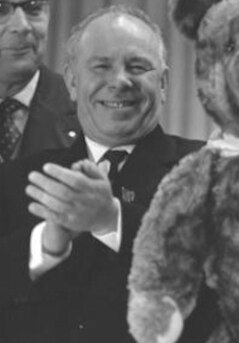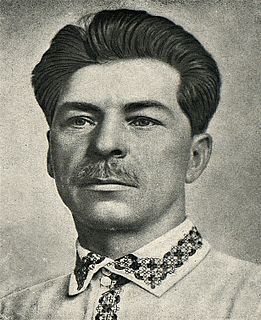The Kyiv City Committee of the Communist Party of Ukraine , commonly referred to as the Kyiv CPU gorkom, was the position of highest authority in the city of Kyiv.
The position was created in 1921, and abolished in August 1991 although most authority was lost in June that year to the position of Mayor of Kyiv. The First Secretary was a de facto appointed position usually by the Central Committee of the Communist Party of Ukraine or the First Secretary of the Communist Party of Ukraine. The First Secretary exercised a large influence throughout the Soviet Union.
| Name | Term of Office | Life years | |
|---|---|---|---|
| Start | End | ||
| ? | 1921 | 193. | |
| E.D. Aronsky | 193. | 1934 | |
| Nikita Alekseyev | 1934 | 1935 | 1892–1937 |
| ? | 1935 | 1937 | |
| Sergei Kudryavtsev | January 1937 | September 1937 | 1903–1938 |
| Afanasiy Yegorov [lower-alpha 1] | 1938 | 1938 | |
| Nikita Khrushchev | 1938 | 1941 | 1894–1971 |
| Nazi German occupation (September 19, 1941 – November 6, 1943) | |||
| Nikita Khrushchev | November 1943 | March 22, 1947 | 1894–1971 |
| Zynoviy Serdyuk | March 22, 1947 | February 1949 | 1903–1982 |
| Oleksiy Hryza | February 1949 | 1950 | 1907–1969 |
| Mykhailo Synytsya | 1950 | 1960 | 1913–1985 |
| Vasyl Drozdenko | June 1960 | August 1962 | 1924–1982 |
| Oleksandr Botvyn | August 1962 | January 1963 | 1918–1998 |
| ? | 1963 | December 1964 | |
| Oleksandr Botvyn | December 1963 | January 11, 1980 | 1918–1998 |
| Yuriy Yelchenko | January 11, 1980 | April 28, 1987 | 1929– |
| Kostyantyn Masyk | April 28, 1987 | July 22, 1989 | 1936– |
| Anatoliy Korniyenko | July 22, 1989 | August 1991 | 1938– |

Vladimir Antonovich Ivashko was a Soviet Ukrainian politician, briefly acting as General Secretary of the Communist Party of the Soviet Union (CPSU) during the period from 24 to 29 August 1991. On 24 August Mikhail Gorbachev resigned from the post, and on 29 August the CPSU was suspended by the Supreme Soviet. Before becoming General Secretary he had been voted Gorbachev's Deputy General Secretary within the Party on 12 July 1990, a newly created position as a result of the 28th Congress of the Communist Party.

The Communist Party of Ukraine is a banned Ukrainian political party founded in 1993 as the successor to the Soviet-era Communist Party of Ukraine which was banned in 1991. The party also has been a member of the Union of Communist Parties – Communist Party of the Soviet Union that was created in 1993 and united all communist parties of the dissolved Soviet Union.

Nikolai Viktorovich Podgorny was a Soviet statesman who served as the Chairman of the Presidium of the Supreme Soviet, the head of state of the Soviet Union, from 1965 to 1977.

Oleksandr Oleksandrovych Moroz is a Ukrainian politician. He was the Chairman of the Verkhovna Rada twice, from 1994 to 1998 and again from 2006 to 2007. Moroz is one of the founders and the leader of the Socialist Party of Ukraine, formerly an influential political party in Ukraine. Moroz lost parliamentary representation when the Socialist Party failed to secure sufficient number of votes (2.86%) in the 2007 snap parliamentary election, falling 0.14% short of the 3% election threshold.

The Galician Soviet Socialist Republic was a short-lived, self-declared Bolshevik political entity that existed from 15 July to formally 21 September 1920 with the capital in the city of Tarnopol. The communist state was established during a successful counter-offensive of the Red Army in the summer of 1920 as part of the Polish-Soviet War and in the course of which the Polish-Ukrainian joint military force was forced to retreat from its positions along the Dnieper that it secured earlier in 1920 all the way to the foothills of the Carpathian Mountains.

Volodymyr Vasylyovych Shcherbytsky was a Ukrainian Soviet politician. He was First Secretary of the Communist Party of the Ukrainian Soviet Socialist Republic from 1972 to 1989.

Georgy (Yury) Leonidovich Pyatakov was a leader of the Bolsheviks and a key Soviet politician during and after the 1917 Russian Revolution.

Petro Yukhymovych Shelest was a Ukrainian Soviet politician. First Secretary of the Communist Party of the Ukrainian Soviet Socialist Republic, a member of the Politburo of the Communist Party of the Soviet Union and a deputy of the Supreme Soviet of the Ukrainian SSR.

Pavel Petrovich Postyshev was a Soviet politician, state and Communist Party official and party publicist. He was a member of Joseph Stalin's inner circle, before falling victim to the Great Purge. In 2010, a court in Kyiv judged Postyshev guilty of complicity in genocide because of his part in causing the mass starvation in Ukraine in the early 1930s, known as the Holodomor.

Mykola Oleksiiovych Skrypnyk, also known as Nikolai Alekseyevich Skripnik, was a Ukrainian Bolshevik revolutionary and Communist leader who was a proponent of the Ukrainian Republic's independence, and led the cultural Ukrainization effort in Soviet Ukraine. When the policy was reversed and he was removed from his position, he committed suicide rather than be forced to recant his policies in a show trial. He also was the Head of the Ukrainian People's Commissariat, equivalent to the modern-day position of Prime Minister of Ukraine.

The Communist Party of Ukraine was the founding and ruling political party of the Ukrainian Soviet Socialist Republic operated as a republican branch of the Communist Party of the Soviet Union (CPSU). No decision of the government of Ukraine was adopted without approval of the Central Committee of the Communist Party of Ukraine. The Communist Party of Ukraine is not one and the same party as the Ukrainian Communist Party or Ukrainian Communist Party (Borotbists).
Oleksandr Pavlovych Liashko was a Ukrainian and Soviet politician. He was the Chairman of the Council of Ministers of Ukrainian SSR for more than 15 years, making him the longest-serving person in that capacity. He joined the Communist Party in 1942 and served in the Central Committee of the Communist Party of the Soviet Union from 1961 to 1989. In 1985 Liashko received the honorary award, the Hero of Socialist Labour.
In Ukraine, the title chief (head) of local (regional) state administration refers to the chief executive of each of the administrative divisions of Ukraine: region, raion (district) or city, in case of Kyiv and Sevastopol.

Mykhailo Oleksiyovych Burmystenko was a Ukrainian and Soviet politician, who served as the Chairman of the Supreme Soviet Ukrainian SSR from 1938 to 1941. Burmystenko died during the Battle of Kiev in 1941 and a memorial remains there in his memory.

Petro Tronko was a Ukrainian academician of the National Academy of Sciences of Ukraine and veteran of World War II.
The Kyiv Regional Committee of the Communist Party of Ukraine, commonly referred to as the Kyiv CPU obkom, was the position of highest authority in Kyiv Oblast during most of the existence of the Soviet Union. The position was created on 27 February 1932, and abolished in August 1991 although most authority was lost in June that year to the position of Governor of Kyiv Oblast. The First Secretary was a de facto appointed position usually by the Central Committee the Communist Party of Ukraine or the First Secretary of the Republic.
The Chairperson of the Sevastopol City State Administration is the head of executive branch for the Sevastopol city. Informally it is referred to as Governor of Sevastopol.
The Sevastopol City Committee of the Communist Party of Ukraine, commonly referred to as the Sevastopol CPU gorkom, was the position of highest authority in the city of Sevastopol.

Kostyantyn Masyk is a Ukrainian state official and diplomat.

The Left Opposition was a Pro-Russian coalition of socio-political organizations and parties in Ukraine established in June 2015.